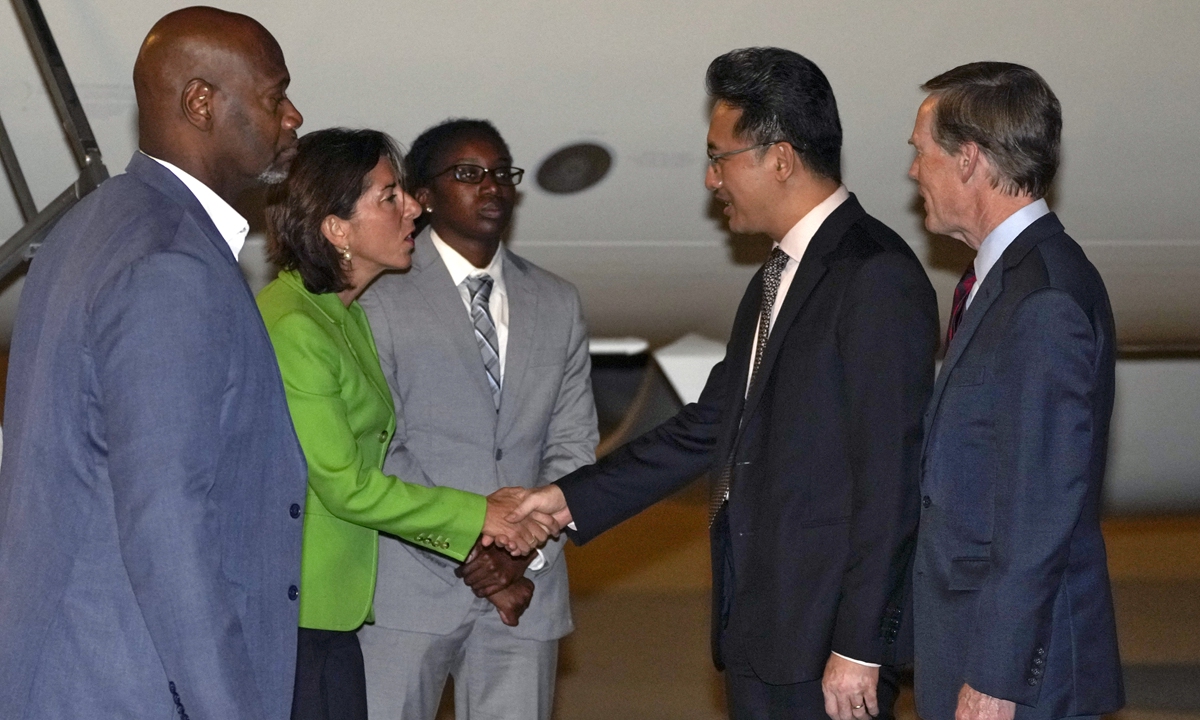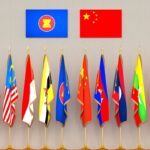By Wang Qi and Xiong Xinyi
After having wrapped up a four-day high-stakes visit to China which she described as “successful and productive,” US Commerce Secretary Gina Raimondo on Sunday (local time) pointed the finger at China’s business environment, talked down China’s economy and defended US chip export restrictions on China during interviews with US media outlets.
Chinese experts on Monday criticized the duplicity of Raimondo and the Biden administration, saying it was indecent and irresponsible for them to ignore China’s recent preferential policies for foreign investment. From Raimondo’s recent comments, it can be seen that the US wants China to accept “cooperation” in fields set by the US that are beneficial to Washington, confining China in a “small yard with a high fence.”
If the US continues to maintain such duplicity, and there is no substantive correction of US hostile and discriminatory trade policies against China, China’s current restrained countermeasures will not be maintained limitlessly. Meanwhile, the speed of development of Chinese enterprises will further show that the US restrictions and blockades against China for political reasons can only satisfy the imagination of politicians, and the damage to the US’ credibility and the interests of American enterprises would be substantial, experts said.
Indecent duplicity
During an interview with the CBS’s “Face the Nation” show on Sunday, Raimondo said China is making things “more difficult,” and she warned that patience with China is “wearing thin” among US businesses, alluding to China’s lack of “a predictable environment and a level playing field.”
The latest negative comments came less than a week after her visit to China, during which material results were yielded, including the establishment of new communication channels to seek solutions to specific business issues and support for enterprises of the two countries in carrying out pragmatic cooperation.
China does not expect all the problems between the US and China to be solved through Raimondo’s single visit, but her duplicity is indecent, Lü Xiang, a research fellow at the Chinese Academy of Social Sciences, told the Global Times on Monday.
This kind of double-dealing face already appeared during Raimondo’s Shanghai trip, where she urged US businesses to keep expanding investment in China, according to CNN. However, this comes in contrast to her comment that China, the world’s second-biggest economy, had become “uninvestable” during the same China trip.
Also on Sunday, Raimondo told NBC’s Meet the Press that the US is “in a fierce competition with China at every level,” but that conflict is in no one’s interest.
Diao Daming, a professor at the Renmin University of China in Beijing, told the Global Times on Monday that the US has chosen “dialogue” in order to avoid a worsening of the situation and to better achieve its own interests.
“But this is obviously not based on mutual respect and win-win cooperation,” Diao noted.
The US is trying to force China to accept a scenario where it is the US that is to decide in which areas to cooperate with China, and in which areas to contain China, based on the strategic interests of Washington, Diao remarked.
The duplicity of Raimondo shows that US still seeks to confine China into its “small yard and high fence,” legitimize and rationalize its measures of containment, Lü said.
In an article published on its official WeChat account on Monday, the Chinese Ministry of State Security stressed that the US’ “double-dealing” strategy has been particularly prominent recently, including, on the one hand, claiming that it does not seek “decoupling” from China, and is willing to maintain communication and normal economic and trade relations, but on the other hand, keeping playing the “Taiwan card” and publicly talking down the Chinese economy.
Eroding of trust and restraint
According to NBC, Raimondo also brought up concerns regarding US “national security.” She said the export controls against Chinese companies are about “national security,” not about gaining an economic advantage.
She noted that the US will not sell its most sophisticated chips to China, and will remain as hard-line as possible with its most advanced technology.
According to Raimondo, almost one-third of the companies from China on the entity list have been put there under President Joe Biden’s administration. On CNN’s State of the Union on Sunday, Raimondo said there are “legitimate concerns” with Chinese investments in the US as it relates to “national security.”
The Biden administration advocates maintaining dialogue with China and regards it as an important achievement, but on the other hand, it is still showing off the “big stick” approach, Lü said.
Despite Raimondo admitting during the CBS interview that the China-US commercial relationship is very large and growing, which “underpins hundreds of thousands of US jobs,” and that stable commercial ties can be a foundation for the entire relationship, so far, the Biden administration has done nothing to correct the hostile and discriminatory trade policies that the US has adopted against China since the Donald Trump era.
China, on the other hand, recently issued a 24-point guideline covering six areas to further optimize foreign investment environment and attract more foreign investment.
Li Yong, a senior research fellow at the China Association of International Trade, told the Global Times on Monday that the US’ established political bias has not changed because of Raimondo’s trip to China.
Raimondo should talk about how to further promote China-US economic and trade relations to return to the right track on the basis of a certain consensus reached by the two sides, as well as China’s concerns and demands under the US restrictions, Li said.
Take the “coincidence” of the sudden presale of Huawei’s Mate 60 Pro smartphone during Raimondo’s China trip.As this smartphone suggests that Chinese companies will inevitably break through the blockade set by the US, and that suppression has failed.
It is hoped that the US can export technology to China on the basis of fair principles, rather than political restrictions, Li said.
“The progress made in the research and development of Chinese high-tech enterprises shows that US restrictions can only satisfy the imagination of some politicians,” Li said. “Blindly restricting and suppressing China will only cause a business reality in which the market share of American enterprises will continue to be eroded in the future, and undermine the trust of the Chinese market to US firms,” he said.
China’s pursuit of a stable and constructive relationship with the US is enduring. Since the US has caused bilateral relations to deteriorate in the past few years, China has not intentionally taken the initiative to escalate tensions, and all actions have been reactive, Lü said.
The visits of a slew of US senior officials to China since June has opened a window for stabilizing bilateral relations, but this window may close, sooner or later if the US continues to insist on its a double-dealing approach, Lü said.
China’s countermeasures are restrained currently, but if the US still lacks concrete actions to improve ties, China’s countermeasures will intensify, the expert noted.













